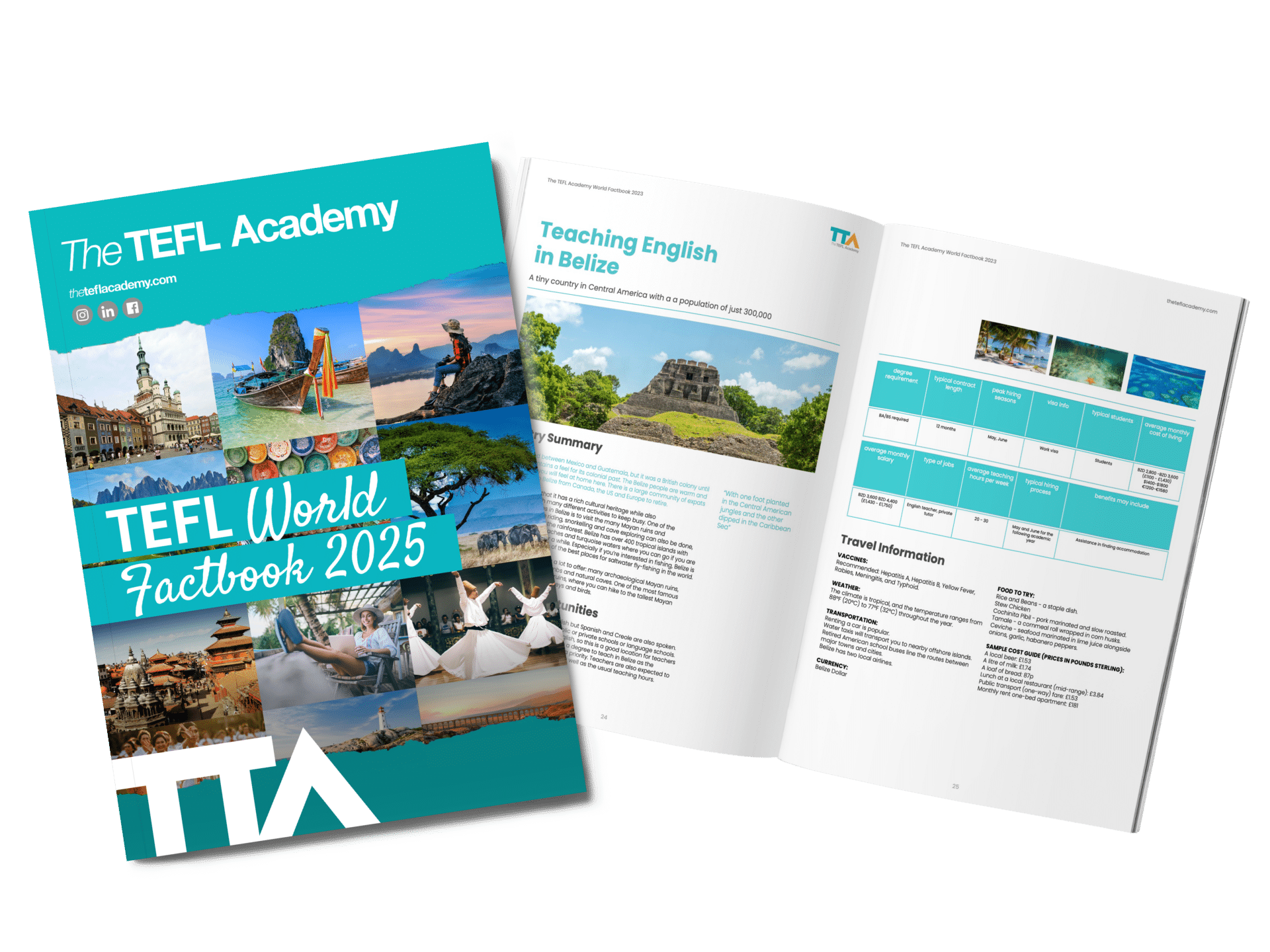Teach English In Libya
a world of opportunities
Join a global community of over 200,000 TEFL teachers working throughout the world! Enrol me!
Contents
Introduction
Teaching opportunities
Teaching requirements
Start your TEFL journey
How to begin teaching in Libya
Bordering the Mediterranean, Libya enjoys a mild Mediterranean climate along the coast while most of the rest of the country is covered by the extremely hot and dry Libyan Desert.
Libya is popular with tourists for its beautiful beaches, but you will find the strict cultural climate may be a deterrent for anyone wanting to stay longer than a holiday. Libya is a strict Muslim country and so has some strict laws: nightlife is limited, alcohol is banned and attitudes towards women are conservative. In short, Libya is not for those wanting a modern lifestyle but rather for those wanting to be a part of rebuilding a historical nation and participating in a more traditional lifestyle.
Historically, Libya is a very interesting country. It gained independence in 1951 after centuries under foreign rule. Oil was discovered soon after and Libya soon became a very wealthy nation as a result. Colonel Muammar Gaddafi seized power in 1969 but was overthrown in 2011. This plunged the country into chaos, but in 2016 a new UN-backed government was installed in Tripoli and a relative state of stability has been restored.
The largest city in Libya is Tripoli, which is also the capital. One of the most impressive sites within Tripoli is the Red Castle. Built in the 16th century, you’ll find one of Libya’s most revered museums, the Red Castle Museum, within the stunning fortress.
With an estimated population of more than six million, Libya is mostly barren terrain. The south of Libya contains a coastal strip with pockets of grassland which leads onto the most barren of places in the world, the Sahara Desert. Known for its unbearable heat and infertile wasteland, the Sahara Desert is famous across the world as a natural feature and made popular for its use in films and television.
Near Shahhat in Libya, you will find an ancient city with both Roman and Greek influence, called Cyrene. In 1982, it was registered as a UNESCO World Heritage Site. It’s the oldest and regarded as the most important of all the Greek cities in the region. Founded in 631 BC, and abandoned in the 4th century AD the area holds monuments including The Temple of Zeus, The Temple of Apollo, and the Agora Victory Monument.
Teaching opportunities
Arabic is the official language of Libya, though a number of Berber languages are also spoken and Italian and English are widely understood.
There are definitely opportunities for EFL teachers here – in language centres, international schools, universities or teaching oil company employees. Teaching positions can be well-paid and Libya can be a good option if you would like to save money. The majority of jobs can be found in the capital, Tripoli.
Teaching requirements in Libya
Teaching English in Libya requires a BA/BS degree, and contracts typically last for 12 months with peak hiring seasons occurring throughout the year. A work permit is required for obtaining a visa, and students of all ages can be expected.
The average monthly cost of living in Libya ranges from 1,500 to 2,000 LYD, while the average monthly salary ranges from 1,700 to 5,200 LYD in local currency. With these factors in mind, teaching English in Libya can be a great opportunity for those looking to gain international teaching experience while immersing themselves in the culture of North Africa.
Start your TEFL journey with The TEFL Academy
Would you like to teach English as a foreign language around the world? Great! You’re in the right place. The TEFL Academy provides the very best in accredited TEFL courses, meaning your qualification is recognised throughout the world. The TEFL Academy is the world’s leading TEFL course provider. We can help you acquire the skills needed to teach English as a foreign language. Check out our TEFL internships, volunteer placements and the thousands of jobs on our exclusive TEFL jobs board.
Contents
How to begin teaching in Libya
Bordering the Mediterranean, Libya enjoys a mild Mediterranean climate along the coast while most of the rest of the country is covered by the extremely hot and dry Libyan Desert.
Libya is popular with tourists for its beautiful beaches, but you will find the strict cultural climate may be a deterrent for anyone wanting to stay longer than a holiday. Libya is a strict Muslim country and so has some strict laws: nightlife is limited, alcohol is banned and attitudes towards women are conservative. In short, Libya is not for those wanting a modern lifestyle but rather for those wanting to be a part of rebuilding a historical nation and participating in a more traditional lifestyle.
Historically, Libya is a very interesting country. It gained independence in 1951 after centuries under foreign rule. Oil was discovered soon after and Libya soon became a very wealthy nation as a result. Colonel Muammar Gaddafi seized power in 1969 but was overthrown in 2011. This plunged the country into chaos, but in 2016 a new UN-backed government was installed in Tripoli and a relative state of stability has been restored.
The largest city in Libya is Tripoli, which is also the capital. One of the most impressive sites within Tripoli is the Red Castle. Built in the 16th century, you’ll find one of Libya’s most revered museums, the Red Castle Museum, within the stunning fortress.
With an estimated population of more than six million, Libya is mostly barren terrain. The south of Libya contains a coastal strip with pockets of grassland which leads onto the most barren of places in the world, the Sahara Desert. Known for its unbearable heat and infertile wasteland, the Sahara Desert is famous across the world as a natural feature and made popular for its use in films and television.
Near Shahhat in Libya, you will find an ancient city with both Roman and Greek influence, called Cyrene. In 1982, it was registered as a UNESCO World Heritage Site. It’s the oldest and regarded as the most important of all the Greek cities in the region. Founded in 631 BC, and abandoned in the 4th century AD the area holds monuments including The Temple of Zeus, The Temple of Apollo, and the Agora Victory Monument.
Teaching opportunities
Arabic is the official language of Libya, though a number of Berber languages are also spoken and Italian and English are widely understood.
There are definitely opportunities for EFL teachers here – in language centres, international schools, universities or teaching oil company employees. Teaching positions can be well-paid and Libya can be a good option if you would like to save money. The majority of jobs can be found in the capital, Tripoli.
Teaching requirements in Libya
Teaching English in Libya requires a BA/BS degree, and contracts typically last for 12 months with peak hiring seasons occurring throughout the year. A work permit is required for obtaining a visa, and students of all ages can be expected.
The average monthly cost of living in Libya ranges from 1,500 to 2,000 LYD, while the average monthly salary ranges from 1,700 to 5,200 LYD in local currency. With these factors in mind, teaching English in Libya can be a great opportunity for those looking to gain international teaching experience while immersing themselves in the culture of North Africa.
Start your TEFL journey with The TEFL Academy
Would you like to teach English as a foreign language around the world? Great! You’re in the right place. The TEFL Academy provides the very best in accredited TEFL courses, meaning your qualification is recognised throughout the world. The TEFL Academy is the world’s leading TEFL course provider. We can help you acquire the skills needed to teach English as a foreign language. Check out our TEFL internships, volunteer placements and the thousands of jobs on our exclusive TEFL jobs board.

Download the World TEFL Factbook
We have created a unique TEFL World Factbook of teaching abroad guides in over 100 countries to help TEFL teachers decide where in the world to teach English. Each country profile outlines everything a TEFL teacher would need to know including average pay, living costs, working environments and even the weather!
Download TEFL Factbook
Other Places In Africa
View AllTeach English Abroad Articles
View All-
 Teach and Travel
Teach and TravelThings To Know About South Korean Classroom Culture
2025-07-10
-
 Resources
ResourcesTeaching On Wall Street English: What You Need To Know
2025-06-30
-
 Resources
ResourcesAwesome English Idioms For EFL Learners – And How To Teach Them
2025-06-27
-
 Teaching English Abroad Jobs
Teaching English Abroad JobsNavigating Culture Shock: My Real Experience Teaching English In Vietnam
2025-06-20
-
 Teach and Travel
Teach and TravelThings To Know About Chinese Classroom Culture
2025-06-15
-
 Teaching Online
Teaching OnlineOnline Teaching Platforms You Need To Know
2025-06-13
 United Kingdom
UK
United Kingdom
UK

































